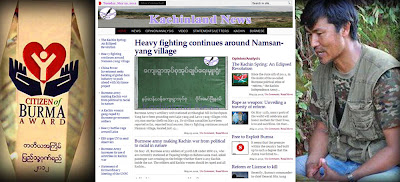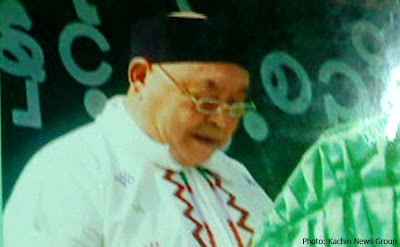April 30 - Reports from eastern Kachin state indicate that forces loyal to the Kachin Independence Organization (KIO) have strengthened their hold on Pangwa, a government controlled town located on the Kachin side of the Sino-Burma border. For many years Pangwa served as the headquarters of the ceasefire group the National Democratic Army-Kachin (NDA-K).
Fighting has continued in the Pangwa area since late last week when Kachin resistance forces launched an offensive to seize the town. There is still some fighting taking place on the outskirts of Pangwa, along the road to Chipwi, however despite these skirmishes it appears the town is now almost completely under the control of the KIO.
According to KIO sources the siege on Pangwa was initially met with heavy resistance from Burma army troops and their local allies in the government controlled Border Guard Force No. 1001, a unit that consists of many former NDA-K members.
On Friday April 28 army helicopters attacked KIO positions near Pangwa, the KIO however was still able to recover and advance on the town.
Fighting is also continuing south of Pangwa at Kambaiti, another border town that was also controlled by the NDA-K. Last Thursday morning, KIO forces reportedly destroyed a bridge on the road connecting Kambaiti to the Kachin state capital Myitikyina.
KIO forces have had Kambaiti surrounded since the end of last week and KIO officers in the field predict the town, some 20 miles east of Myitkyina, will soon fall.
Capture of Pangwa symbolic milestone for KIO
The KIO's reported capture of Pangwa marks a significant milestone for the five decade old organization, as the town was for many years the headquarters of the NDA-K, itself a successor to a breakaway KIO faction.
In 1968 KIO commanders Zahkung Ting Ying (also Zakhung) and Layawk Zalum (also Zelum) split from the KIO, then led by anti-communist Zau Seng, to form an alliance with the Burma Communist Party (BCP).
With the assistance of their new communist comrades, Zahkung Ting Ying and Layawk Zalum' formed 'War Zone 101' a unit which fought under the BCP. Following the dissolution of the BCP in 1989, War Zone 101 was transformed into the National Democratic Army-Kachin (NDA-K) and a ceasefire was signed with the junta in Rangoon then known as SLORC (State Law and Order Restoration Council).
The lucrative ceasefire agreement enabled the NDA-K and its leaders to profit from the trade in timber and other goods that passed through Kambaiti and Pangwa to China. Tensions emerged in September 2005 when a rebellious faction led by Layawk Zalum briefly seized control of the NDA-K command before Zahkung was able to reassert his authority. The September 2005 mutiny was followed some 8 months later by a similar rebellion against Zakhung's leadership in May 2006. The second mutiny also failed but left Zahkung considerably weaker.
The challenge to Zahkung's leadership reportedly stemmed from the fact the NDA-K chief wasn't sharing the profits derived from the group's lucrative stake in the region's border trade. Large sections of the NDA-K rank and file were also upset that Zahkung continued to rely on Chinese soldiers for his own personal security.
In 2009 under Zahkung's leadership the NDA-K officially ceased to exist when its standing army of about 1,000 troops was officially absorbed by the government controlled border guard force. Zahkung was later elected to Burma's parliament as an independent MP in November 2010.
Although over the past few years Zahkung has continued to show loyalty to Burma's government by publicly criticizing the KIO in state media and penning open letters to the KIO demanding the group respect Naypyidaw's authority, Zahkung was reported to have been put under house arrest in Myitkinya in June of last year when fighting resumed between the KIO and the Burma army. Zahkung's arrest came about despite the fact he hadn't been an active member of the KIO for 43 years.
According to KIO sources on the front-line, over the past few days many ex-NDA-K troops have surrendered to the KIO. Upon capture the ex-NDA-K troops are said to have asked to rejoin the KIO.





















